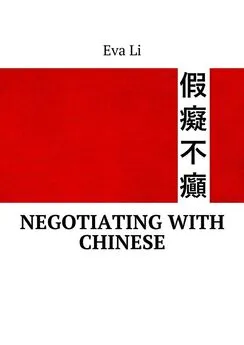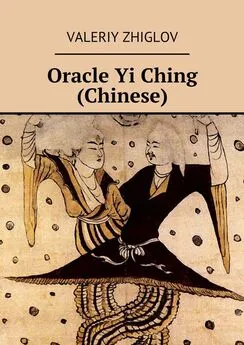Eva Li - Negotiating with Chinese
- Название:Negotiating with Chinese
- Автор:
- Жанр:
- Издательство:Литагент Ридеро
- Год:неизвестен
- ISBN:9785448392740
- Рейтинг:
- Избранное:Добавить в избранное
-
Отзывы:
-
Ваша оценка:
Eva Li - Negotiating with Chinese краткое содержание
Negotiating with Chinese - читать онлайн бесплатно ознакомительный отрывок
Интервал:
Закладка:
China can digest anything. It digested the Mongols, who invaded China and established the Yuan dynasty, and it digested the Manchus, who also invaded the country and established the Qing dynasty, but in the end, both dynasties are considered the most «Chinese» of all. Moreover, China even digested the West and communism. It is no coincidence that sinologists unofficially regard China’s communist party as yet another dynasty.
The patterns of behavior, thinking, and outlook, which were established before Confucius and were later cultivated by him, are clearly traceable in today’s interpersonal relationships, business matters and negotiations. The most important thing for Chinese employees is laoban – their boss, director, i.e. the person in charge. He is their emperor. Whatever he says should be done, will be done. Regular clerks are 100% subordinate to him and fulfill all his orders. Even if you get hold of his contact information (which is highly unlikely), you will not be able to reach him. His employees will carefully protect his peace.
At the negotiation table he is mostly silent, listening attentively and paying attention to everything. He is unlikely to address you directly, and he will probably tell the negotiator what to say on his behalf.
Decisions are also made only by the laoban . This is why it is important to develop guanxi , or connections with him (more on that in chapter 2), so that he knows you in person and has an understanding of who you are. This connection helps ease the negotiation process, among other things.
Seek out the laoban or get ready for some lengthy negotiations.
Conformism
Conformism is compliance with a certain set of rules or norms, and a tendency to stay within their margins. Every kind of relationship is regulated, whether inside the family or between the sexes, co-workers, holidaymakers, friends and neighbors.
Conformism caused me a lot of trouble when I left everything behind and arrived in China for the first time. The Chinese largely rely on template thinking and on stereotypes, so if anything outside the template occurs, they usually find it extremely unsettling. Flustered and at a loss, they do not know what to do and how to deal with whatever the issue is.
Want to get a new credit card? You’ll have to wait for 2 hours. Want to transfer some money via Western Union? You’ll have to wait for 2 hours. Want to extend your visa? Again, 2 hours.
Two vivid examples come to mind.
I went to a bank once to open a Chinese account. The teller, a Chinese woman, took my passport and, without checking with me first, scanned my Schengen visa, thinking it was the main page with all the data she needed. Then she pointed at the words «Schengen Visa», written in Roman characters, and asked me, which of the two words was my given name and which was my surname.
Another time, I was extending my visa at a visa center. A Chinese clerk took my passport to copy my details into his computer, when he almost literally froze over my date of birth, because Chinese dates go like this: year, month, date.
To make things worse, helping a Chinese person in such a case is out of the question, or else they will lose face, closing the door on any further cooperation.
So, if you want something from a Chinese supplier, do not use words; simply send them a relevant picture, blueprint, video, etc.
If you still need to explain something, keep it simple, very simple, perhaps even split it into several parts, and by all means send a picture, a scheme, anything with concrete figures. Do not, however, forget to explain these figures in the letter, keeping it as simple as possible, and the Chinese will most certainly understand you.
Do not load them with several unrelated questions. Stick to one question, one topic, and one letter. This will help avoid any confusion. True, it is hard. But it will be much harder to sort out a whole shipping container of damaged goods, because the Chinese misunderstood something and did everything according to their usual template. Remember that the Chinese think stereotypically, which means the following: you are a barbarian; the best things in the world are Chinese; it is possible to deceive you; they do everything the way they are used to; making changes requires additional thinking, which is tiresome, so it is easier to say, «We can’t do it». Also, always verify and re-verify what they say.
Interaction with the outside world
All civilizations outlived the stage of ethnocentrism, but they either disappeared or changed their opinion along with the world’s geopolitical development, which is why ethnocentrism became obsolete. It is, however, still alive in China. There are three reasons for it.
1. Geography.
China takes up most of Asia. As I have already mentioned, China is geographically isolated from the rest of the world (mountains, sea, desert), which is why the Chinese «stewed in their own juice» for a long time, so to speak.
2. Ideology
In China, the difference between a Chinese and a barbarian has always been highlighted. The Great Wall of China is a material manifestation of the «us and them» distinction.
3. Level of development
China’s cultural level was much more advanced compared to many other Oriental lands’ both in ancient and medieval times.
All this led the Chinese to think of themselves as the Middle Nation, the only cultured and developed country in the world, surrounded by savages and barbarians who need to be civilized.
China’s mission was to establish and maintain a balance between all things and people. This is where the notion of «Sinosphere» is derived from, which was to be accepted by all non-Chinese peoples. China, however, never intended to conquer anyone. The barbarians were supposed to see the beauty of the Chinese culture, to recognize it as the only true one and to accept it willingly as their own.
There were three types of barbarians. The first one included China’s immediate neighbors (Korea, Japan, and Vietnam). The second consisted of nomadic and seminomadic Asian tribes, who sometimes paid tribute to Chinese rulers. The third type comprised the rest of the world, or the so-called «remote barbarians», including us.
China’s attitude towards the barbarians was similar to that of senior to minor, or lord to vassal. They still have a very clear distinction between «Chinese» and «barbarian». By definition, they do not see us as cultured, exalted beings, and they initially do not consider us as equals. This is why upsetting the arrangements made with us, barbarians, is fine with them.
Chinese people still believe that if a day goes by without tricking at least one foreigner, this day is a waste. As a result, they charge us higher prices than they do their fellow Chinese. They will never respect us the way they do each other.
If you have been to China, especially in smaller cities, you may have noticed the Chinese blatantly pointing their finger at you, or taking pictures, or shouting something in your direction. This is because you were some sort of exotic animal they had never seen before. They have always treated barbarians like this, and it is likely they always will.
This tendency is often noticeable during negotiations. If you use English to negotiate, they will quote a higher price than they would if you spoke Chinese. Plus, if you speak their language, they will see you in a totally different light. Your Chinese language skills will not make you their equal, but they will transform you into a proximate kind of barbarian, who has accepted China as the best culture in the world and is doing all he or she can to become civilized. Moreover, if a person knows not only the language, but also the Chinese negotiation technique, his or her success can be tremendous.
So, to open the gates to China, you have to accept that you are a barbarian and a savage willing to become a civilized person with the help of the Chinese culture.
Associative thinking
As I have mentioned earlier, the Chinese rely on stereotypes, templates, patterns, and analogies. It is a clear manifestation of the Chinese mentality and their associative thinking. There are two reasons for this.
1. Characters
Psychologists say that Far Eastern countries have a special kind of thinking, formed by the use of characters. One character contains 500 times the information a single Roman or Cyrillic letter does.
2. Ancestor worship, which Confucius cultivated and strengthened in the minds of the Chinese. Ancestor veneration also refers to the ideals of conduct and thinking, which were followed in the past. These ideals are to be followed in the present as well, no changes applied, because all the best is back in the past.
Конец ознакомительного фрагмента.
Текст предоставлен ООО «ЛитРес».
Прочитайте эту книгу целиком, на ЛитРес.
Безопасно оплатить книгу можно банковской картой Visa, MasterCard, Maestro, со счета мобильного телефона, с платежного терминала, в салоне МТС или Связной, через PayPal, WebMoney, Яндекс.Деньги, QIWI Кошелек, бонусными картами или другим удобным Вам способом.
Интервал:
Закладка:










